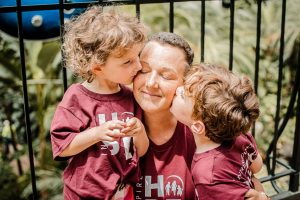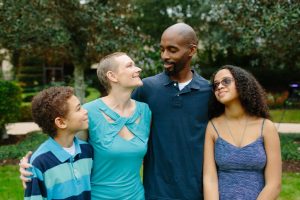On October 10th, professional triathlete and Inheritance of Hope supporter Ruth Brennan Morrey, Ph.D., competed in the IRONMAN World Championship in Kailua-Kona, Hawaii. She’s 1 of only 9 American women to compete in the 2.4 mile swim, 112 mile bike, 26.2 mile run, and she finished 23rd among professional female athletes worldwide. Due to her years of training, Ruth has a unique perspective on resilience, perseverance, and faith. She also turned 40 years old on race day!
Ruth served as a counselor on the Inheritance of Hope (IoH) NYC Legacy Retreat® in November 2014, and she raised money for IoH as part of her desire to give back through her IRONMAN experience. Her supporters rallied around her passion for families facing the loss of a parent, raising nearly $5,000! Her efforts will fully fund 1 family’s NYC Legacy Retreat® next month — an opportunity to make precious memories while they are still able!
Ruth has a Ph.D. in Counseling Psychology with a focus in health psychology, thus she brings a strong skill set to her involvement with IoH. Here, we asked Ruth a few questions prior to her race and heard her thoughts on how her experiences relate to IoH and life at large.
Q: You have mentioned that you focus on a pre-selected scripture on race day. Tell us more about that.
A: Each race holds its own unique mental and physical challenges. While the foundation of my mindset and preparation is similar, the details and nuances are different. Any challenge we have in life or training has its solutions in scripture, and I try to find a verse that is applicable to me for the particular race or difficulty I might anticipate. I write the verse on the back of my hand or put a piece of tape on my bike as a constant reminder of personal strength and clarity during the race. It reminds me about honoring God by giving it my best and getting through dark moments. Quite honestly, I don’t know how I could get through training, races, or life without this grounding.
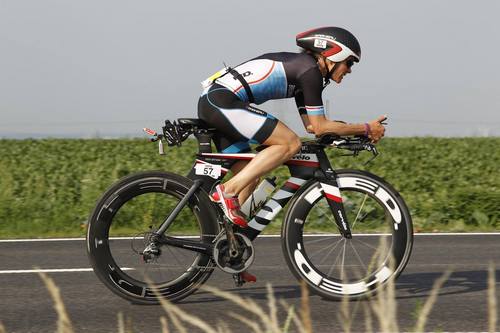 |
| Ruth on her bike at IRONMAN Frankfurt |
Q: You turn 40 on October 10th. What are the ages of some of the other most elite women triathletes?
A: Professional triathletes are a motley crew largely comprised of past college athletes of varying sports (e.g. swimmers, track, soccer, basketball). The majority of long course female professionals are in their 30s. Triathlon is a sport that takes a while to build up consistency over the years, and also takes a while to figure out. There are plenty of women in their late 30s who are still achieving greatness and winning major races. There are also several female professionals who balance sport within their “other” lives. Several are mothers, some work part or full time, and others have advanced degrees (M.D., Ph.D., J.D.)—a Type A personality bunch!
Q: As a professional triathlete, what is your relationship like with the other women you race against?
A: When I travel to races, there is little opportunity to get to know other females on a personal level. I might meet a few new female pros at a race venue and have friendly chats when possible, but we are all there to do a job. Our priority is to be focused and prepared. There are several fiercely competitive female pros whom I truly admire for how they conduct themselves outside of racing—those who stick to their values, advocate for the sport, and use their platform for good without getting caught up with their branding or appearance. This is refreshing. I love following them and seeing them do well in the sport.
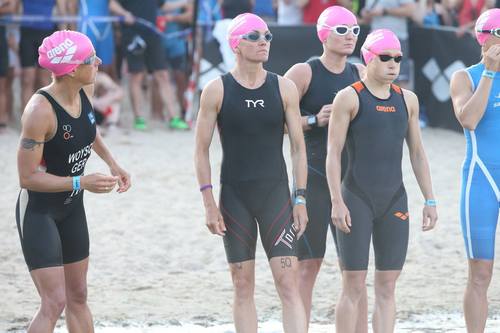 |
| Focused competitors |
Q: On your website, you wrote, “Using my gifts and talents in an honoring way is the only way I care to race.” Tell us more about that.
A: After four years of college soccer, I took a marathon training class, which exposed my long distance running talents. In my second marathon, my goal was to break 3 hours, but I mistakenly qualified for the 2000 Olympic Marathon Trials in 2:48. Since I had the motor to run long relatively fast, continuing this trajectory became an expected route put upon myself, not a soul-searching personal choice or prior goal. I was 23 years old, and I didn’t have the emotional maturity or knowledge base to progress in a way that would set me up for long-term success. I found myself having minimal enjoyment. I raced for product not process, was plagued with injuries, and most notable, I was running without a purpose. A Ph.D., three kids, and 10 years later, I didn’t compete in a single race. During those 10 years, I also grew in my faith and came to understand the importance of God-driven purpose in my life. When I began triathlon, I promised myself and my family that if I was going to race, I would keep my purpose alive and race with an entirely different mindset. This vow has helped me tremendously, but I’m cognizant that it can easily slip away as triathlon is such a self-focused sport. Even beyond sport, intentionality and purpose should be acknowledged and constantly revisited to stay grounded, motivated, and dedicated to use our gifts and talents in a way in which they were intended.
 |
| Ruth with her family |
Q: What does your weekly training look like?
A: On the average week, I swim 5-6x per week, bike 4x, run 4x, and strength train 2x per week. The cumulative training time ends up being 16-28 hours per week depending on my race schedule and the time of year. Each session targets a different body system and thus has a different purpose and intensity. Some sessions are very easy, and some are extremely difficult. My coach, Dr. Phil Skiba of Physfarm, provides my training schedule on a weekly basis, and through smart training, I’m proud to say that I have remained relatively injury free in the last five years.
Q: Do you have any particular strategies for the upcoming race?
A: Although this is my first World Championship appearance, I have come to respect and fear this race for its course and environmental difficulty. To sum it up, each variable—wind, heat, humidity, and isolation—will unfold at its extreme. My strategy presents as 5 ‘P’s: patience, pacing, prayer, perseverance, and problem solving. My strategy going into this race is to study and learn the course as much as possible and not get caught up in race hype. Remaining mentally calm and focused, racing within myself, and remaining patient throughout the day is the #1 goal. The 6th ‘P,’ physical preparation, will have been the easy part to the demands of the race. The mental grit required to perform well in Kona was conveyed by my coach: “I’m glad you are a woman of faith…because you are going to need it.” My final strategy is to chase, chase, chase with my signature run until I cross the line.
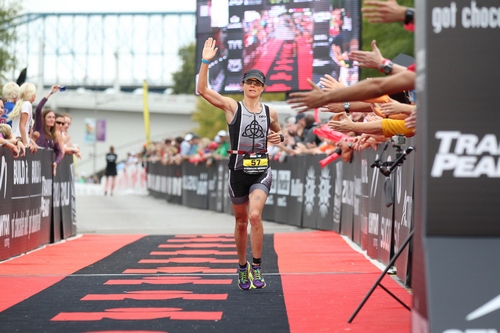 |
| Finishing strong at IRONMAN Chattanooga |
Q: Do you have any particular concerns about the upcoming race?
A: Concerns or anxiety are always interesting words to navigate. The swim, bike, and run all present themselves with uncertainty—water current, winds, other athletes. I tend to be most ‘concerned’ about a race 5-6 weeks out from the race, because I feel rushed to be in top form—oh, my poor coach! When the race approaches, everything falls into place, and my anxiety tends to be at a healthy minimum.
Q: Any plans for after the race (since it is your birthday)?
A: I am fortunate to have quite an entourage of support from family and friends—17 total fans! My plan is to squeeze my little kids at the finish and thank all of my family for their support. To be honest, the term “after the race” is foreign to me. It almost feels like this day is the end for me, as I haven’t looked a day past October 10th, 2015 in quite some time. However, a birthday in Kona, after a day of exercise, needs to include a chocolate lava cake!
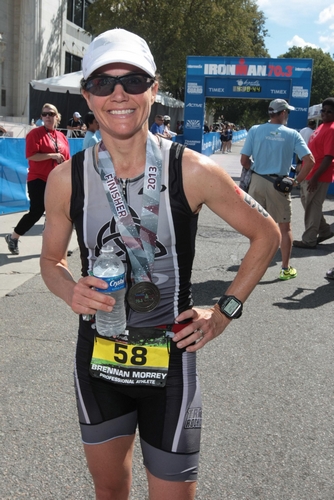 |
| Feeling good after a race |
Q: Tell us more about your involvement with IoH and how you came to be involved.
A: I learned about IoH from my good friend and swimming buddy, Betsy Ogren, who has served as a volunteer and IoH Coordinator. She told me about an IoH Orlando Legacy Retreat® a few years ago and explained the mission of Inheritance of Hope. As I sat there listening in her living room, I couldn’t help but envision myself serving within the organization. My doctoral dissertation focused on the construct of hope and functional impairment among rehabilitation patients, and my Ph.D. was in counseling psychology with a health psychology focus. Not only was my heart in it academically, but I also lost my mother to chronic disease when I was 17 years old. The combination of my personal and professional experiences perfectly aligned with the IoH mission! I served as a counselor at the 2014 New York City Legacy Retreat® and felt right at home.
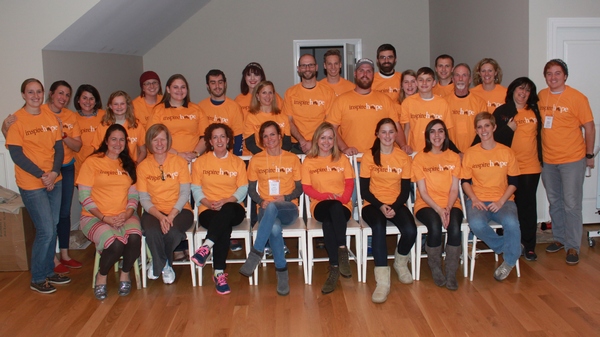 |
| At home with the NYC Legacy Retreat® team |
Q: How does your Ph.D. training help you in your involvement with IoH?
A: My Ph.D. training has given me research and therapy competency, in addition to working directly (in both individual and group therapy) with individuals with chronic disease. The construct of hope is an interesting one and applies directly to this population and this organization on many levels. From an academic sense, hope is unlike wishful thinking or optimism. It is an action-oriented term (versus a passive optimism), and hopeful people find or create pathways to their goals. We see this all the time with cancer patients—trying new treatments, taking risks, traveling across the US for specialist care, and embracing moments with their families. As Christians, we view hope as having an endless relationship with God, and IoH is an organization that allows for legacies and memories to be created for the next generation.
Follow Ruth in her journey to Kona at www.ruthbrennanmorrey.com, or on Twitter @ruthbrennanmorrey.
Angie Howell is constantly inspired by the people she meets in the Inheritance of Hope family. She has volunteered with us since 2012 and became involved after reconnecting with her college classmate, IoH Co-Founder Kristen Milligan. Angie lives in Atlanta with her husband Clay and two daughters.

